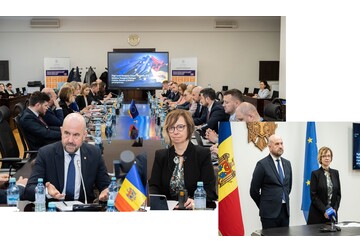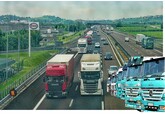
Moldova and the EU will enhance cooperation in the transport sector; Moldova will seek a permanent liberalization of transport and could become an important regional transport hub
This was said during the second EU-Moldova Transport Dialogue held in Chisinau, co-chaired by Moldovan Infrastructure and Regional Development Minister Vladimir Bolea and Director General of the European Commission's Directorate General for Mobility and Transport (DG MOVE) Magda Kopczynska. The dialogue focused on further strengthening cooperation between all transport modes and discussing future initiatives in the transport sector, modernization of infrastructure and Moldova's integration into European transport networks. The agenda included a number of topics crucial for the development of EU-Moldova transport relations, including the strengthening of strategic connectivity based on the successful operation of the EU-Ukraine Solidarity Belt, as well as closer integration of the EU and Moldovan markets and harmonization of the regulatory framework in the transport sector. Infrastructure development and Moldova's plans for multimodal logistics hubs, as well as the integration of digital technologies in the transport sector were discussed during the dialogue. Areas of cooperation also include the Transport Community, which supports regional integration and knowledge sharing. Vladimir Bolea emphasized the importance of the sectoral cooperation for the sustainable development of Moldova's transport infrastructure and for bringing it closer to the EU standards. He said Moldova is aligning its transport infrastructure development model with the European one, emphasizing multimodal hubs, ensuring the transition to more sustainable transport and reducing logistics costs. “We are determined to complete the process of transposing the European legislation in the transport sector by 2027,” Vladimir Bolea said. He also noted Moldova's intention to initiate discussions on the permanent liberalization of transport, an important measure to support the sector and increase competitiveness. “The liberalization of transport, in force until the end of this year, has become a real support for our sector. That is why we want to initiate discussions on a permanent liberalization regime. It is important to offer our carriers stability and predictability so that they can operate with confidence and develop in the long term,” added Vladimir Bolea. For her part, Magda Kopczynska welcomed Moldova's progress in harmonizing the national legislation with the EU norms and in developing infrastructure projects linked to the trans-European transport networks. At the same time, she reiterated the EU's commitment to support Moldova in harmonizing with the European transport rules and standards. “Moldova is an important partner for the European Union and progress in the transport sector will open new economic opportunities and increase the region's connectivity,” Magda Kopczynska said. // 04.04.2025 – InfoMarket







